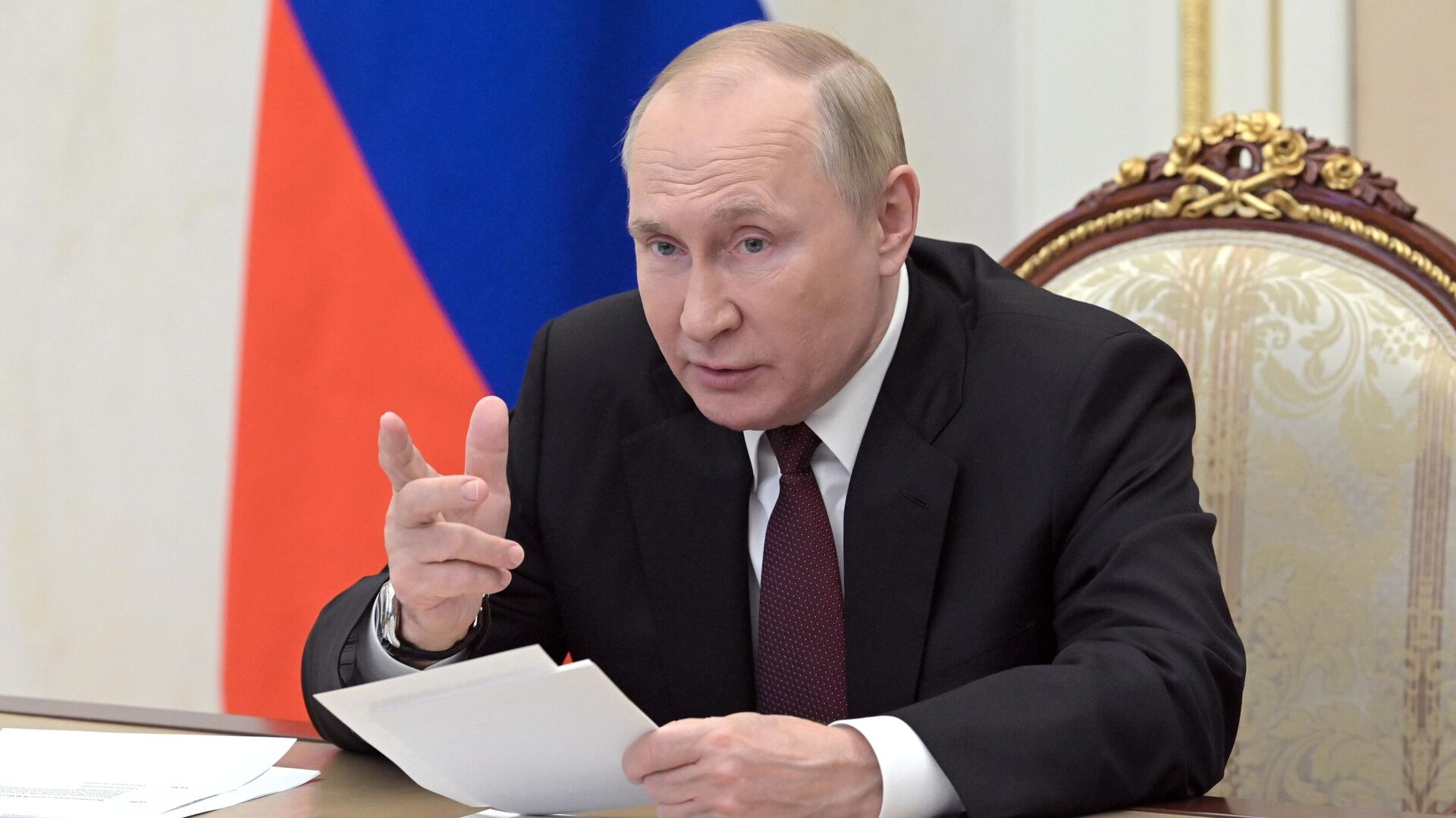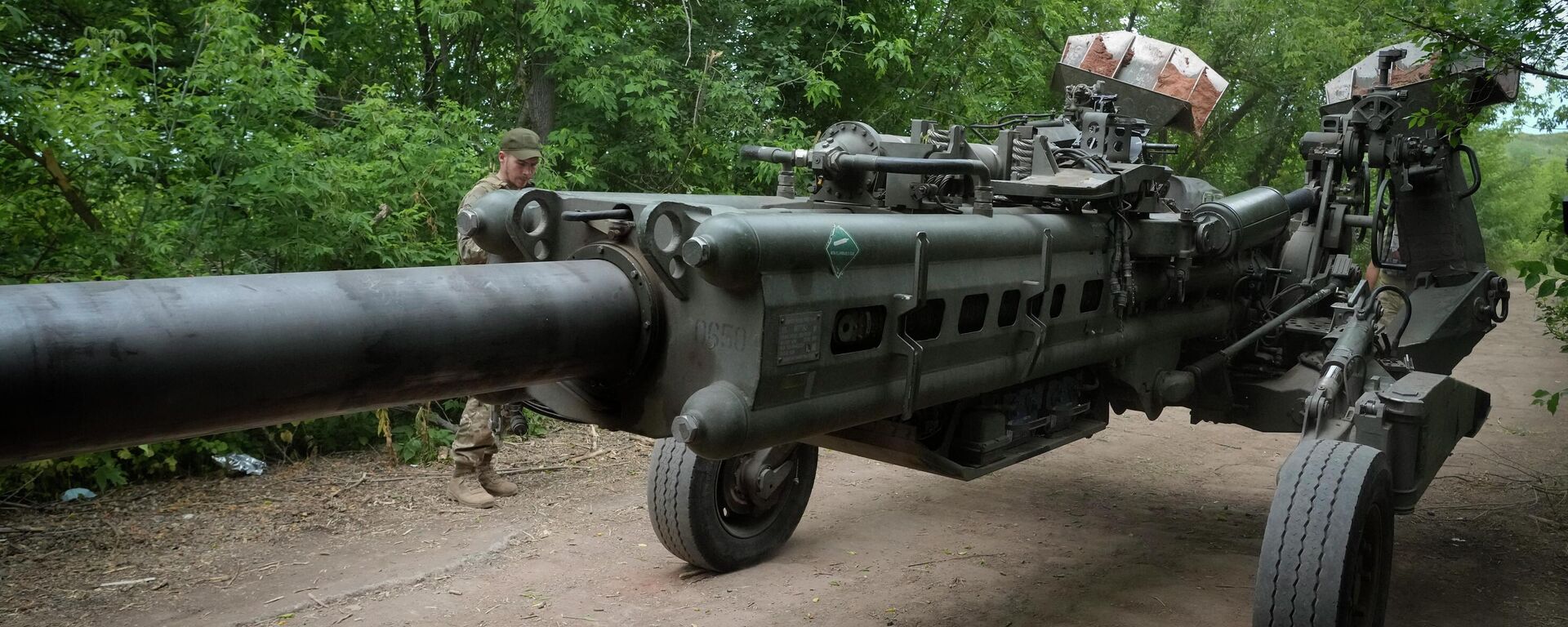https://sputnikglobe.com/20221026/ukraine-has-been-turned-into-tool-of-us-foreign-policy-has-practically-lost-its-sovereignty-putin-1102709292.html
Ukraine Has Been Turned Into Tool of US Foreign Policy, Has Practically Lost Its Sovereignty: Putin
Ukraine Has Been Turned Into Tool of US Foreign Policy, Has Practically Lost Its Sovereignty: Putin
Sputnik International
Russian authorities and senior military officials have expressed serious concerns in recent days over Kiev's possible use of a 'dirty bomb' on its own... 26.10.2022, Sputnik International
2022-10-26T11:47+0000
2022-10-26T11:47+0000
2022-10-26T12:58+0000
vladimir putin
russia's special operation in ukraine
russia
ukraine
us
tool
biological warfare
weapons
https://cdn1.img.sputnikglobe.com/img/07e6/0a/1a/1102723965_0:172:3030:1876_1920x0_80_0_0_cf720553067d408af96b23d50034e0a3.jpg
The United States has turned Ukraine into a "battering ram" to attack Russia, President Vladimir Putin has said.Characterizing contemporary Ukraine as a nation that's been turned into a "tool of American foreign policy," Putin suggested that Washington's "true attitude" toward its "satellites" has been clearly demonstrated in the country, with its territory "almost immediately turned into a testing ground for military biological experiments" in the aftermath of the 2014 Maidan coup.The Russian president accused Washington of ignoring Kiev's talk about acquiring a nuclear weapon, as well as false flag provocations involving a 'dirty bomb', and instead continuing to pump the country full of heavy weaponry.Similar threats are being faced by other post-Soviet republics that haven't yet fallen into Washington's orbit, Putin said.Amid the continued flow of weapons to Kiev, Putin warned of the ever-present danger of the country being turned into a weapons black market used by transnational criminal groups smuggling arms worldwide to foment new crises. "This is not a question only of small arms; there are risks of more powerful weapons falling into the hands of criminals, including man-portable air defense systems and high precision weapons," Putin said.The CIS is a regional intergovernmental organization formed in the immediate aftermath of the destruction of the Soviet Union in 1991. Originally including twelve of the fifteen former Soviet republics, the body now has nine member states - Russia, Armenia, Azerbaijan, Belarus, Kazakhstan, Kyrgyzstan, Moldova, Tajikistan and Uzbekistan. Georgia and Ukraine dropped out in 2008 and 2018, respectively, with the Turkmenistan opting for associate member status in 2005.The CSTO is an intergovernmental military alliance comprised of six former Soviet states - Russia, Armenia, Belarus, Kazakhstan, Kyrgyzstan and Tajikistan. Serbia is an observer in the organization. Azerbaijan, Georgia and Uzbekistan dropped out of the CSTO in the late 1990s.Russia launched a military operation in Ukraine in February amid warning signs that Kiev was preparing a new attempt to crush the fledgling Donbass republics by force and join NATO. The security crisis in Ukraine began in the spring of 2014, when the residents of the Donetsk and Lugansk regions declared independence from Kiev after a US- and EU-backed coup in the capital. Crimea broke off from Ukraine and rejoined Russia several months earlier amid threats by Kiev to outlaw the Russian language and send ultranationalist thugs to the peninsula to deal with pro-Russian agitators. Russia, France and Germany sought to put an end to the crisis in 2015 via the Minsk Accords - a peace plan proposing the Donbass's reintegration into Ukraine in exchange for broad autonomy. Successive governments in Kiev dragged their feet on implementing the agreement, with an attempt by then-newly elected President Volodymyr Zelensky to do so in 2019 met with large-scale protests by ultra-right and pro-Western political forces threatening to overthrow him. Minsk was declared "dead" in early 2022 following the unprecedented escalation of shelling, sabotage and sniper attacks in the Donbass.
https://sputnikglobe.com/20221018/russia-to-organize-meeting-on-us-biological-laboratories-activities-in-ukraine---official-1102058993.html
https://sputnikglobe.com/20220804/exclusive-ukrainians-sell-nato-supplied-weapons-abroad-1098120922.html
https://sputnikglobe.com/20220411/ukraine-from-2004-to-2022-from-the-first-maidan-to-catastrophe-1094623112.html
russia
ukraine
Sputnik International
feedback@sputniknews.com
+74956456601
MIA „Rossiya Segodnya“
2022
News
en_EN
Sputnik International
feedback@sputniknews.com
+74956456601
MIA „Rossiya Segodnya“
Sputnik International
feedback@sputniknews.com
+74956456601
MIA „Rossiya Segodnya“
vladimir putin, russia, ukraine, us, tool, biological warfare, weapons
vladimir putin, russia, ukraine, us, tool, biological warfare, weapons
Ukraine Has Been Turned Into Tool of US Foreign Policy, Has Practically Lost Its Sovereignty: Putin
11:47 GMT 26.10.2022 (Updated: 12:58 GMT 26.10.2022) Russian authorities and senior military officials have expressed serious concerns in recent days over Kiev's possible use of a 'dirty bomb' on its own territory to accuse Moscow of nuclear terrorism. The threat of such a false flag attack would escalate the eight-year-old Ukrainian security crisis into dangerous and uncharted new territory.
The United States has turned Ukraine into a "battering ram" to attack Russia, President Vladimir Putin has said.
"The country has factually lost its sovereignty and is being directly controlled by the United States, which is using [Kiev] as a battering ram against Russia, against our Union State with the Republic of Belarus, against the Collective Security Treaty Organization and the Commonwealth of Independent States (CIS) as a whole," Putin said, speaking at a meeting of CIS security and special services chiefs on Wednesday.
Characterizing contemporary Ukraine as a nation that's been turned into a "tool of American foreign policy," Putin suggested that Washington's "true attitude" toward its "satellites" has been clearly demonstrated in the country, with its territory "almost immediately turned into a testing ground for military biological experiments" in the aftermath of the
2014 Maidan coup.

18 October 2022, 22:04 GMT
The Russian president accused Washington of ignoring Kiev's talk about acquiring a nuclear weapon, as well as false flag provocations involving a '
dirty bomb', and instead continuing to pump the country full of heavy weaponry.
Similar threats are being faced by other post-Soviet republics that haven't yet fallen into Washington's orbit, Putin said.
"Attempts to foment color revolutions have not stopped, the playing cards of nationalism and extremism are being actively used, armed conflicts are being ignited which directly threaten the security of all CIS members. What those doing this hope to achieve can be seen in the example of Ukraine," Putin said.
Amid the continued flow of weapons to Kiev, Putin warned of the ever-present danger of the country being turned into a weapons black market used by transnational criminal groups smuggling arms worldwide to foment new crises. "This is not a question only of small arms; there are risks of more powerful weapons falling into the hands of criminals, including man-portable air defense systems and high precision weapons," Putin said.
The CIS is a regional intergovernmental organization formed in the immediate aftermath of the destruction of the Soviet Union in 1991. Originally including twelve of the fifteen former Soviet republics, the body now has nine member states - Russia, Armenia, Azerbaijan, Belarus, Kazakhstan, Kyrgyzstan, Moldova, Tajikistan and Uzbekistan. Georgia and Ukraine dropped out in 2008 and 2018, respectively, with the Turkmenistan opting for associate member status in 2005.
The CSTO is an intergovernmental military alliance comprised of six former Soviet states - Russia, Armenia, Belarus, Kazakhstan, Kyrgyzstan and Tajikistan. Serbia is an observer in the organization. Azerbaijan, Georgia and Uzbekistan dropped out of the CSTO in the late 1990s.
Russia launched a military operation in Ukraine in February amid warning signs that Kiev was preparing a new attempt to crush the fledgling Donbass republics by force and join NATO. The security crisis in Ukraine began in the spring of 2014, when the residents of the Donetsk and Lugansk regions declared independence from Kiev after a US- and EU-backed coup in the capital. Crimea broke off from Ukraine and rejoined Russia several months earlier amid threats by Kiev to outlaw the Russian language and send ultranationalist thugs to the peninsula to deal with pro-Russian agitators. Russia, France and Germany sought to put an end to the crisis in 2015 via the Minsk Accords - a peace plan proposing the Donbass's reintegration into Ukraine in exchange for broad autonomy. Successive governments in Kiev dragged their feet on implementing the agreement, with an attempt by then-newly elected President Volodymyr Zelensky to do so in 2019 met with large-scale protests by ultra-right and pro-Western political forces threatening to overthrow him. Minsk was declared "dead" in early 2022 following the unprecedented escalation of shelling, sabotage and sniper attacks in the Donbass.





